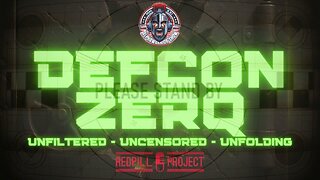Premium Only Content

Report on How Eviction is stopped or delayed part 1
Subscribe thank You https://www.youtube.com/@constitutionalconventions6240
Subscribe to We the People Constitutional Conventions on Rumble https://rumble.com/c/c-1516344
Subscribe to Constitutional Conventions on Rumble https://rumble.com/user/ConstitutionalConventions
Subscribe to get important Information
https://constitutionalconventions.ca/contact/ - ensure you get confirmation - check spam or junk mail.
Zoom 5-10 EST daily https://us02web.zoom.us/j/6945489985?pwd=UllwRmwzRUhWS2pXUWNQODNEbnhSZz09 SwT80SwT8
https://rumble.com/v4govwc-facts-vs-fiction-know-who-owns-the-land-not-canada-or-their-corrup-peice-of.html
[email protected]
Before the event:
1- Have several supporter with you.
2- Obtain knowledge of the laws that govern the eviction process.
3- Make sure everyone IS at the location before the law enforcers
4- Every one know their role, have recording material like paper and pen, video and sound recording equipment etc
5- Rehearse eviction simulation and roles everyone is expected to play.
6- Learn asking pertinent questions rather than making statement and claims.
7- Stay as polite and composed as possible (no disrespect, anger, load voice etc,) with everyone involved specially the Law enforcers, LE.
8- Be well prepared documenting/recording/ taking notes as soon as LEs arrive. 9- Prepare several copies of SCQ. https://takeactioncanada.ca/wp-content/uploads/2021/06/Public-Servants-Questionnaire_v1.pdf
At the time of encounter:
a. Only one individual interacts with LEs. Preferably the individual subject to eviction, or who can Handel the encounter.
b. Meet and interact with them out side of your property, rather than allowing the to come in.
c. Inform them they may be trespassing, if you have NT sign on the property.
d. Avoid emotion and fear.
e. Get LEs, and anyone with them, for complete the CSQ.
f. Be assertive examining the legal documents, including court order, for authenticity and lawfulness. Accept NO PHOTOCOPY or documents without signature of the author.
g. Avoid being involved in physical interactions.
h. Do not abandon your property voluntarily.
i. Fully document the event and compare notes.
Read information and suggestions provided by experts such as: https://www.nolo.com/legal-encyclopedia/fighting-your-foreclosure-in-court.html
Learn the legal process and ALL steps that needs be satisfied for eviction to be lawful. Above link can be a useful source.
Fighting Your Foreclosure in Court
How difficult it is to challenge a foreclosure depends greatly on what type of foreclosure you're facing: judicial or nonjudicial. It's easier and less expensive to jump into an existing lawsuit with a judicial foreclosure than it is to challenge a nonjudicial foreclosure. If your foreclosure is nonjudicial, which means it proceeds outside the court system, you'll have to file a lawsuit to challenge the process.
Summary of How to Fight a Foreclosure in Court
While every foreclosure case is unique and different states have their own procedures, here's a summary of how you might go about challenging each type of foreclosure, with more details on the procedures below.
Judicial Foreclosure
To contest a judicial foreclosure, you have to file a written answer to the complaint (the lawsuit). You'll need to present your defenses and explain the reasons why the lender shouldn't be able to foreclose. You might need to defend yourself against a motion for summary judgment and at trial.
If you have strong evidence that the lender or servicer made an error in the foreclosure procedures, like by failing to send you a breach letter, initiating the foreclosure too soon, or not following state foreclosure procedures, you might be able to force it to start the foreclosure over. Or you might get enough leverage to work out a way to save your home, like with a loan modification.
Nonjudicial Foreclosures
With a nonjudicial foreclosure, the process happens outside of a court's supervision, so you'll have to file a lawsuit to get a judge's attention. And you'll have the burden of proof because you want the judge to stop a proceeding (the foreclosure) that's already authorized by the mortgage or deed of trust you signed with you took out the loan.
How to Fight a Judicial Foreclosure
In a judicial foreclosure, the foreclosing party (the "lender") must file a lawsuit to get the foreclosure started. You'll be notified of the foreclosure case when papers called a summons and complaint (or petition) are delivered to (served on) you.
The documents will advise you of the lawsuit and give you a limited amount of time to respond if you choose to contest it. And, significantly, the lender will have the burden of proving to the judge that the foreclosure is justified under the mortgage terms.
What Proof Will the Lender Provide?
The proof will typically consist of the documents you signed when taking out or refinancing your loan, like a mortgage (or deed of trust) and a promissory note. The paperwork might also include:
copies of notices the servicer sent to you
signed agreements
assignments and endorsements
internal accountings of payments both made and missed, and
written statements under oath—called "declarations" or, if sworn before a notary public, "affidavits"—from lender employees or servicer who claim to have knowledge of how many payments you missed and the lender's compliance with your state's laws regarding foreclosure procedures.
Generally, if you don't point out errors or omissions in the paperwork or procedures, the court will accept them as sufficient evidence, award the lender a default judgment, and order a foreclosure sale.
Filing an Answer to the Lawsuit
If you decide to respond to the suit, you can tell a judge why you think the foreclosure isn't warranted. You must present your objections to the foreclosure by filing an "answer" with the court by a specific deadline.
What's an "Answer" in a Lawsuit?
If you want to respond to the suit, an answer is the document that you file with the court and serve to the other parties in the case. Your answer tells the court your side of the story.
The deadline is usually between 20 and 30 days after service, though it varies. Check the summons you received along with the complaint to find out how much time you have to file an answer in your case.
You must prepare your answer in the proper format, including responses to each of the claims made by the lender and any defenses you might have. For each numbered paragraph in the complaint, you
should admit, deny, or say you don't have sufficient information to admit or deny (and so you deny) the allegations contained in that particular paragraph.
You may also ask that the lender prove its claims, like how many payments it says you've missed and the fees it claims you owe. Be aware that if you admit an allegation, the lender doesn't have to prove it. (Denying something that a complaint says doesn't necessarily mean you're saying it didn't happen. Instead, you're saying that the lender must prove it. Sometimes, it's a good idea to deny a "fact" that seems correct, usually because you might be able to make a legal argument about the way the fact is stated.)
You'll also need to raise any defenses and affirmative defenses in your answer, such as the lender doesn't have the right to foreclose (called "standing"), as well as any counterclaims, like the servicer violated federal mortgage servicing laws, if applicable.
Why You Might Want to File an Answer
If you don't file an answer by the deadline, the lender's attorney will likely ask for a default judgment. To get the court to set aside (annul) a default judgment, you'd have to file a motion and show good cause for not filing an answer. Getting a court to set aside a default judgment is very difficult.
In addition, if you don't file an answer, you aren't entitled to get notifications about what's happening in your foreclosure case. The court may proceed with the foreclosure without your involvement or notifying you about the proceedings.
You also will likely lose the right to assert any defenses you could have against the foreclosure. If you don't include particular defenses or counterclaims in an answer, you might not be able to bring them up later on in the foreclosure.
Of course, you shouldn't file a frivolous answer. Otherwise, you might get stuck paying the costs and expenses of the opposing parties, including their attorneys' fees.
What Happens After You File an Answer: The Lender Might Ask for Summary Judgment
The lender might then file a summary judgment motion, asking the judge to decide the case without a trial. You get the right to oppose the motion by submitting your arguments and evidence in a response to the motion. You need to serve your response to the other parties, and the court may then hold a hearing.
If the court determines that you don't have evidence supporting a defense, the lender will win the motion, get a judgment of foreclosure, and be able to go forward with a foreclosure sale. If the judge denies the lender's motion, the court will allow the case to proceed to trial.
Discovery
Before the trial, "discovery" will take place. This process is when you and the lender ask each other for facts, documents, and other information before the trial. In a foreclosure, each side may ask the other to provide certain information (through a demand for the production of documents, interrogatories, and depositions) that might help prove or disprove the right to foreclose.
Borrowers sometimes make discovery demands in their answer or when opposing a motion for summary judgment on the basis that discovery is necessary to expose specific facts about the case or facts that the lender claims are true. But you'll have to show that discovery might lead to relevant evidence or that the facts you need to justify your opposition to the foreclosure are exclusively within the lender's knowledge and control. Otherwise, the court might go ahead and grant summary judgment.
Handling a Trial
At the trial, the lender must try to prove it has the right to foreclose. Then, you must show that the lender shouldn't be permitted to foreclose.
You'll both present your cases, sometimes through witnesses who can be questioned by the judge and cross-examined by the other side. For example, if you and the lender disagree about how many payments you've missed, both you and a representative who works for the loan servicer would testify, and the judge would decide which of you is most likely telling the truth.
At the end of the trial, the judge will either:
order the foreclosure to go ahead and, in many states, set the sale date, or
dismiss the case, probably "without prejudice," which means the lender can still foreclose, but it has to start the process over.
Strict Foreclosure: Only in Vermont and Connecticut
In a strict foreclosure in Vermont or Connecticut, a judge who approves the foreclosure can order ownership (title) of the home to be transferred to the lender then and there, without holding a foreclosure sale.
How to Fight a Nonjudicial Foreclosure in Court
Because nonjudicial foreclosures proceed outside of court, you'll have to file a suit in court to get a judge to review the matter. And you'll have the burden of proof because you want the judge to stop a proceeding (the foreclosure) that's already authorized by the mortgage contract.
You'll need to include a motion for a temporary restraining order (TRO) and preliminary injunction to enjoin (stop) a foreclosure sale while your claims are being litigated. Usually, homeowners also ask the court for a permanent injunction.
Asking for a Temporary Restraining Order
In your application for a TRO, you'll have to show the judge that you'll suffer "irreparable injury" if the foreclosure happens. Courts often agree that losing your property to foreclosure causes irreparable harm.
Courts sometimes grant TROs without a formal notice or hearing, so the lender might not have much time to respond. The judge will probably grant the TRO if the lender doesn't respond to your motion.
However, you might have to post a bond to protect the lender from economic harm if you eventually lose the case. A bond could be expensive, but you might, in some circumstances, get the bond requirement waived, like if you don't have much income or if the court decides that the lender's interest is adequately protected.
Some courts have said that bonds aren't required in foreclosures, especially in cases where the property value exceeds the amount the borrower owes, because the lender has a secured interest in the property and can eventually foreclose if the borrower loses the case. Or, you could suggest paying the bond by making payments, such as at your regular monthly mortgage payment amount or in an amount that would offset any expense the lender might incur during the process, or in a minimal (de minimus) amount.
A temporary restraining order usually lasts until a court hearing in which you'll try to get a preliminary injunction stopping the foreclosure pending a full trial.
Preliminary Injunction
The court will review each party's documents at the preliminary injunction hearing. (The documents are usually the same type of paperwork that's used in judicial foreclosures.)
You'll have to prove your case, like by showing that the lender didn't follow state or federal foreclosure laws or the terms of the deed of trust. You'll have to convince the judge at this preliminary injunction stage that the foreclosure should be put on hold until you can produce your full case at trial. You might use declarations or affidavits from you and other witnesses to establish the facts you believe should stop the foreclosure.
At this hearing, the court must look at whether:
you're likely to win at trial, and
the injury that you would suffer from the foreclosure outweighs the injury that the lender is suffering by not getting paid.
If the judge decides for the lender, the TRO will end, and the court will deny your motion for a preliminary injunction. While you can still proceed with your lawsuit, the foreclosure will likely go ahead because an injunction isn't in place to prevent it. While it's a long shot, you might be able to ask a higher court to overrule the denial.
But if you're able to convince the judge to halt the foreclosure until you can present your full case at trial, the judge will issue a preliminary injunction. The lender might then try to settle with you, give up on the current foreclosure and start over, or meet any conditions the court sets and then ask the court to lift the injunction. Otherwise, you'll go to trial. The preliminary injunction enjoins the foreclosure pending the trial.
When It Might Be Worth Fighting Your Foreclosure
If it's clear that the lender failed to follow the law and, as a result, you were deprived of an important right, it might be worth it to fight the foreclosure in court. After all, if you could get the foreclosure dismissed or significantly delayed, you might be able to stay in your house much longer than you would otherwise. Or you might gain leverage that could help you in working out a way to keep it.
You might have a decent shot at stopping or at least delaying a foreclosure if you have a strong defense, for example:
the lender started the foreclosure based on false information, like if your payments were credited to the wrong party and you were never behind, or the servicer substantially overstated the amount you had to pay to reinstate your mortgage, depriving you of your reinstatement rights under state law, or
you can prove that the lender didn't follow state requirements for a foreclosure, like by failing to properly send you a notice of intent to foreclose, if required in your state, or it violated federal mortgage servicing laws.
Sometimes, though, filing an answer in a judicial foreclosure or starting a suit to fight a nonjudicial foreclosure isn't the best option. Say you're facing a judicial foreclosure and you have an argument that requires you to file another type of pleading to preserve your rights. Filing an incorrect response might cause you to lose an important right.
For instance, if the lender made an error, like failing to properly serve you with the foreclosure lawsuit, you can dispute the court's jurisdiction by filing a motion to dismiss. If you win, the foreclosure has to start over. But if you file an answer, you likely stipulate (agree) that the court has the right to hear the case, and the foreclosure goes ahead.
Litigation is complicated, and most people fare better after getting help from an attorney
-
 1:00
1:00
We The People - Constitutional Conventions
19 hours agoLicense To Kill across the DEATH CULT CANADA! The Elite parasites the poppy to celebrate 11 11 11 depopulation of the slaves
1721 -
 7:40
7:40
Blabbering Collector
15 hours agoLEAKED: Draco Malfoy, Hooch, Neville Longbottom! | Harry Potter HBO Show Update, Wizarding News
25.2K2 -
 3:06:35
3:06:35
Badlands Media
18 hours agoDEFCON ZERQ Ep. 017: Tesla Tech, Ancient Power & The Fight for Human Consciousness
245K66 -
 3:11:56
3:11:56
TimcastIRL
10 hours agoDOJ Launches FULL INVESTIGATION Into TPUSA Antifa RIOT, Media Says Mostly Peaceful | Timcast IRL
276K111 -
 3:16:27
3:16:27
Barry Cunningham
14 hours agoBREAKING NEWS: SOLVING THE HOUSING CRISIS BY UNDERSTANDING VETERANS DAY! AND IT'S MOVIE NIGHT!
90.3K35 -
 8:58:17
8:58:17
SpartakusLIVE
12 hours agoWZ Solos to Start || NEW Battlefield 6 - REDSEC Update Later
31.9K1 -
 1:01:56
1:01:56
ThisIsDeLaCruz
20 hours ago $14.29 earnedInside Kenny Chesney’s Sphere Part 1: Exclusive Backstage Pass
44.2K2 -
 2:09:50
2:09:50
DLDAfterDark
10 hours ago $5.23 earnedA Complete Look Into The Glock "V Series"! Pistol In Hand! VERY GAY!!
27K2 -
 7:42
7:42
China Uncensored
17 hours agoIndia Has Surpassed China
52K22 -
 8:47
8:47
Hollywood Exposed
15 hours agoJoe Rogan and Zachary Levi DESTROY Gavin Newsom’s Lies About California
33.6K7